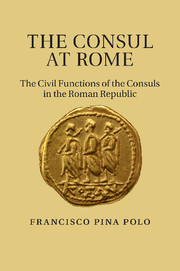Book contents
- Frontmatter
- Contents
- List of illustrations
- Acknowledgements
- Introduction
- PART I THE CONSULAR FUNCTIONS IN THE PRE-SULLAN AGE (367–81)
- 1 The consuls taking office
- 2 Consuls and civic religion
- 3 Consuls, the agents of diplomacy in the Roman state
- 4 Communication between the consuls and the people: edicts and contiones
- 5 Consuls as legislators
- 6 The jurisdiction of the consuls
- 7 Consuls as promoters of public works
- 8 Colonization and distribution of land
- 9 Appointment of a dictator
- 10 Consuls presiding over elections
- 11 The consular year in the pre-Sullan age
- PART II THE CONSULAR FUNCTIONS IN THE POST-SULLAN AGE (80–50)
- 15 Conclusion
- Bibliography
- Index of Subjects
- Index of Ancient Sources
- Index of Ancient Personal Names
10 - Consuls presiding over elections
Published online by Cambridge University Press: 25 October 2011
- Frontmatter
- Contents
- List of illustrations
- Acknowledgements
- Introduction
- PART I THE CONSULAR FUNCTIONS IN THE PRE-SULLAN AGE (367–81)
- 1 The consuls taking office
- 2 Consuls and civic religion
- 3 Consuls, the agents of diplomacy in the Roman state
- 4 Communication between the consuls and the people: edicts and contiones
- 5 Consuls as legislators
- 6 The jurisdiction of the consuls
- 7 Consuls as promoters of public works
- 8 Colonization and distribution of land
- 9 Appointment of a dictator
- 10 Consuls presiding over elections
- 11 The consular year in the pre-Sullan age
- PART II THE CONSULAR FUNCTIONS IN THE POST-SULLAN AGE (80–50)
- 15 Conclusion
- Bibliography
- Index of Subjects
- Index of Ancient Sources
- Index of Ancient Personal Names
Summary
One of the tasks performed by consuls during their term in office was to preside over the annual elections. This was not a function exclusive to consuls, as it could also be carried out by a dictator or an interrex. In fact, in the fourth century, the sources do not explicitly allude to any consul ever acting as president over electoral comitia – which obviously does not mean that they did not perform such a task – yet we know of the intervention of interreges, as well as of the appointment of dictators, solely to conduct the election process in various years throughout that century. Between 367 and 298, the presidency over elections belonged to a dictator or an interrex on sixteen occasions, or at least this was the intention, since at times the appointment of a dictator was challenged for a variety of reasons. For the remaining years one of the consuls must have presided over the elections.
In the consular year 297/6 Q. Fabius Maximus Rullianus was the first attested consul to act as president over elections. From then on, the presidency of dictators and interreges became exceptional, and it was more commonly the consuls who were in charge. We know the name of the presiding consul for some of the years at the beginning of the third century and for almost every year between the beginning of the Second Punic War – during which, due to the military situation, dictators were mainly in charge of the electoral process – and 167.
- Type
- Chapter
- Information
- The Consul at RomeThe Civil Functions of the Consuls in the Roman Republic, pp. 192 - 207Publisher: Cambridge University PressPrint publication year: 2011



